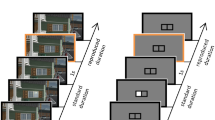Abstract
Normal variation in temporal orientation has been examined in community dwelling, healthy older subjects but not in elderly hospital patients. We examined the validity of errors in different aspects of temporal orientation as a guide to the presence or absence of cognitive impairment orientation in elderly hospital patients in 150 consecutive patients on the day after admission to an acute geriatric unit. Cognitive impairment (delirium or dementia or both) was diagnosed without reference to temporal orientation. Optimum cutoffs for error scores on the different aspects of temporal orientation (date/year/month/day of the week/time of day) were calculated to maximize the sum of sensitivity and specificity for detection of cognitive impairment. Of the 150 patients, 45 (30%) had cognitive impairment. The best cutoffs for detection of cognitive impairment were an error of more than 3 days in the date; any error in the year, month, or day of the week; and an error of more than 1 h in identifying the time of day. Error in identifying the year had the highest positive likelihood ratio (6.4 [95% confidence interval 4.0–10.3]) for detecting cognitive impairment and the lowest negative likelihood ratio (0.1 [0.04–0.3]) for the exclusion of cognitive impairment. Failure to identify the year correctly is the aspect of temporal orientation most closely related to cognitive impairment.
Similar content being viewed by others
REFERENCES
American Psychiatric Association (1987). Diagnostic and Statistical Manual of Mental Disorders(3rd Ed., rev.), Author, Washington, DC.
Benton, A. L., Eslinger, P. J., and Damasio, A. R. (1981). Normativeobservations on neuropsychological test performances in old age. J. Clin. Neuropsychol. 3: 33–42.
Benton, A. L., Sivan, A. B., Hamsher, K., Varney, N., and Spreen, O. (1984). Contributions to Neuropsychological Assessment (2nd Ed.), Oxford University Press, New York.
Berrios, G. E. (1983). Orientation failures in medicine and psychiatry: Discussionpaper. J. Roy. Soc. Med. 76: 379–385.
Brotchie, J., Brennan, J., and Wyke, M. A. (1985). Temporal orientationin the presenium and old age. Br. J. Psychiat. 147: 692–695.
Desmond, D. W., Tatemichi, T. K., Figueroa, M., Gropen, T. I., and Stern, Y. (1994). Disorientation following stroke: Frequency, course and clinical correlates. J. Neurol. 241: 585–591.
Folstein, M. F., Folstein, S. E., and McHugh, P. R. (1975). Mini-mental state--A practical methodfor grading the cognitive state of patients for the physician. J. Psychiat. Res. 12: 189–198.
Inouye, S. K., van Dyck, C. H., Alessi, C. A. et al. (1990). Clarifying confusion: The confusion assessment method; a new method for detection of delirium. Ann. Intern. Med. 113: 941–948.
Levin, H. S., and Benton, A. L. (1975). Temporal orientation inpatients with brain disease. Appl. Neurophysiol. 38: 56–60.
O'Keeffe, S. T. (1994). Rating the severity ofdelirium: The Delirium Assessment Scale. Int. J. Geriatr. Psychiat. 9: 551–556.
Simel, D. L., Samsa, G. P., and Matchar, D. B. (1991). Likelihood ratios with confidence: Sample size estimation for diagnostic test studies. J. Clin. Epidemiol. 44: 763–770.
Varney, N. R., and Shephard, J. S. (1991). Predicting short term memory on the basis oftemporal orientation. Neuropsychol. 5: 13–16.
Author information
Authors and Affiliations
Rights and permissions
About this article
Cite this article
O'Keeffe, S.T., Crowe, M., Gustau, B. et al. Interpreting Errors in Temporal Orientation in Older Hospital Patients. Journal of Clinical Geropsychology 7, 47–52 (2001). https://doi.org/10.1023/A:1026464718498
Issue Date:
DOI: https://doi.org/10.1023/A:1026464718498




